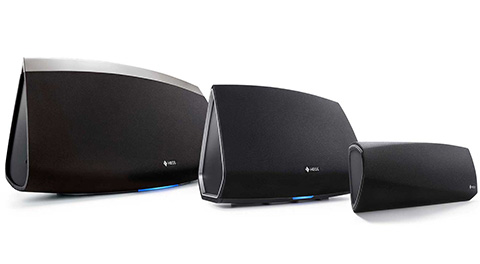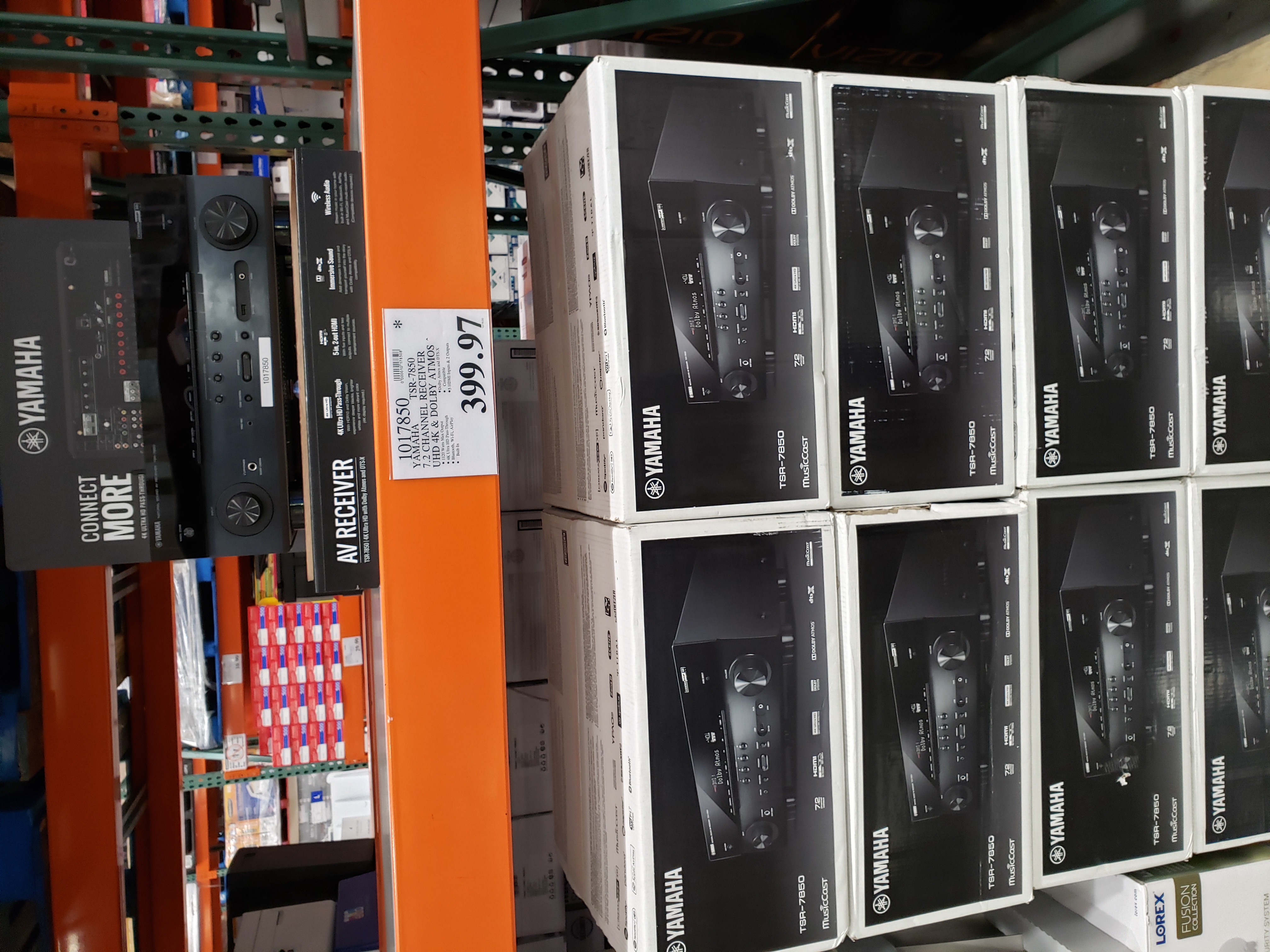Yamaha wireless speakers work with two: Deezer and TIDAL. They also work with Napster, which can stream MP3 files with up to 320 kbps bitrates, although these files are significantly less than CD quality. To stream high-res audio, you’ll need to use a Wi-Fi. The WXAD-10 is operated using Yamaha’s free MusicCast Connect app, available for iOS and Android smart devices. It offers an intuitive interface that makes access to the Yamaha’s extensive feature set a simple affair. The app allows for streaming from a variety of services, including Deezer, Qobuz, Spotify and Deezer, as well as Juke.
Don’t judge this book by its cover! The Yamaha WXAD-10 might look like an innocuous little box, but its feature set is impressive: it adds streaming capability to anything from existing stereo systems to lifestyle mini-systems, and delivers the sonic goods, too
Streaming is the new buzzword. Whether that entails streaming music from network-attached storage, from on-line services such as Tidal, Deezer or Spotify, or from the thousands of Internet stations, it opens up an almost unlimited catalogue of material.
The Yamaha MusicCast WXAD-10 offers a quick and convenient way to add streaming capability to existing endpoints. Those endpoints could be an existing stereo or home theatre system, or even a smaller, all-in-one lifestyle set-up.
The Yamaha will also work with active speaker systems, as well as headphones. And if you own other networked Yamaha MusicCast devices, the WXAD-10 can share content with those devices, too.

Finally, the Yamaha will accept wireless data streams from iOS devices using Apple AirPlay, and from any device capable of transmitting audio using Bluetooth.


AT FACE VALUE
It’s had to equate all that functionality with a small, lightweight box that measures just 13 cm high wide and 11 cm deep. The front is adorned by three LED status lights that confirm power on, as well as active Wi-Fi and Bluetooth connections.
At the rear, you’ll find a 3,5 mm analogue minijack output, a stereo RCA output set, an RJ45 network socket, and a 5V DC power input. Power comes from a wall wart-type supply, included in the package.
The base of the unit has four rubber ‘feet’ and recessed buttons marked power, connect, and option. These are used during the initial set-up phase, but should not be needed thereafter, unless you change the installation.
The WXAD-10 is operated using Yamaha’s free MusicCast Connect app, available for iOS and Android smart devices. It offers an intuitive interface that makes access to the Yamaha’s extensive feature set a simple affair.
The app allows for streaming from a variety of services, including Deezer, Qobuz, Spotify and Deezer, as well as Juke and Napster. Depending on the country you’re in, some of those won’t be available.
In addition, the app will allow music playback from network-attached storage devices: you can select from compatible NAS devices on the network, and then navigate and select content. Then there’s Internet radio, searchable by type (music or podcasts) and then by various categories: location, quality, trending, etc.
Finally, if you have a device that can play back using Bluetooth (Android smartphones and many high-res digital audio players, for instance), the Yamaha will accept Bluetooth audio streams. For iOS fans, there’s AirPlay compatibility, allowing content from an iDevice to be sent directly to the Yamaha.
As the WXAD-10 is part of Yamaha’s MusicCast network family, it can share content with any MusicCast device on the same network, which opens up some attractive multiroom and sound distribution possibilities without any additional investment.
UNDER THE COVERS
It might look almost too plain and simple to be true, but the Yamaha conceals some sophisticated electronics under that basic casework. Notably, it employs a Burr-Brown PCM5121 DAC to support a broad array of lossy and lossless digital audio files.
Thus WAV, FLAC and AIFF files are supported at up to 192 kHz/24-bit resolutions, and ALAC up to 96 kHz/24-bit. In addition, the Yamaha will also play back WMA, MP3 and MPEG4/AAC at up to 320 kbps levels.
According to Yamaha, signal paths have been optimised to prioritise sound quality, while circuit components have been selected with the same objective in mind. The network module includes a high-precision, low-jitter clock to make the most of high-res sources.
SETTING UP
Getting the WXAD-10 up and running is pretty much a plug and play affair. I connected the stereo RCA outputs to an Electrocompaniet EC4.7 pre-amp, plugged in a network cable and the power cord, and pressed the ‘Connect’ button on the base of the unit.
That allowed the MusicCast app to recognise the unit, after which there were options to name both the network and the ‘room’ (In the MusicCast universe, each MusicCast device occupies a ‘room’ or zone).
If you prefer a wireless connection, the Yamaha is 802.11 Wi-Fi capable. Once it recognises the network as wireless, the app will use the logon credentials on the smart device running the app to hook up to the Wi-Fi network.

Next, you can enter logon details for those streaming services you have access to (Tidal and Deezer, in my case), while Spotify is accessed using the Spotify Connect app, which then sees the WXAD-10 as an endpoint and streams content to it.
Similarly, if you want to stream music from your iDevice, you simply open the app you want to stream from (Apple Music, for instance) and select the Yamaha as the playback device from the list under the AirPlay icon.
Any Bluetooth audio device that can stream to a Bluetooth receiver will work with the Yamaha: I used my Astell & Kern AK Junior for that purpose. It quickly recognised and paired with the WXAD-10, and was then accessible via the Bluetooth source setting on the MusicCast app.
As mentioned earlier, the Yamaha comes equipped with a 3,5 mm stereo input jack, which accepted a pair of Sennheiser Momentum on-ear headphones. Using the jack conveniently cuts the output signal to the RCAs, while the volume level can be adjusted via the app.
Yamaha don’t make a song and dance of the WXAD-10’s ability to accommodate headphones, but it certainly had enough muscle to drive the Momentums with ease.
Admittedly, at 18 ohms, the Sennheisers present a fairly benign load, and the WXAD-10 might well struggle with less efficient headphones.
In all, it took less than 10 minutes to get everything up and running, after which operation was seamless and intuitive.
SOUNDS LIKE …

The Yamaha delivered a sonic performance that was satisfactory and enjoyable throughout, but was predictably reliant on the quality of the source signal. Thus, best results were achieved from high-res lossless WAV files stored on the NAS.
Eugene Istomin’s measured but majestic reading of Mozart’s Piano Concerto No.21 is immaculately captured as a 176,4 kHz/24-bit WAV file on the Reference Recordings label, and the Yamaha treated it with deference.
To be fair, it lacked some of the sparkle and tonal intensity that I was used to when listening to the same recording using my reference PS Audio DirectStream DAC, but then the DirectStream is a lot more expensive and sonically sophisticated!
The WXAD-10 sounded more polite, and more constrained in staging terms, but in a purely musical context, the sound was still engaging and inviting. It provided an articulate rendition of Istomin’s piano, and managed to believably capture the scale and presence of the orchestra.
‘Madrugada’, off the Yellowjacket’s A Rise In The Road set, was delivered with plenty of spunk and pace. The incisive drumwork and textured tenor sax were confidently expressed, while ensuring that the often subtle piano passages weren’t glossed over in the process.
Yamaha Deezer Problem
Streaming The Jayhawks’ Back Roads And Abandoned Motels from Tidal as a 44/16 FLAC file showcased a sound that was certainly entertaining and engaging. ‘Bitter End’ sounded clean and open, with loads of detail that allowed the slick interplay of the vocal harmonies to come to the fore.
Material drawn from Deezer was also presented with a sense of clarity, given that the stream was delivered as a lossy MP3 file – in fact, from that perspective, the sonic results were admirable.
The same Jayhawks track sounded a little flatter in the upper trebles, and lacked some spatial dimension, but it remained both listenable and enjoyable. Bluetooth and AirPlay streams were not only reliable, but also came across with enough vigour and conviction to make for pleasing listening.
THE BOTTOM LINE
The Yamaha WXAD-10 is a small box with a big heart. It brings a wealth of streaming capabilities to existing systems and set-ups in a package that is easy to set up and simple to use.
It’s a competent and capable performer in sonic terms, too: it treats high-res material with deference, and makes the most of lossy formats and streams. The result is a device that gets to grips with the music well.
That said, it’s a pity that Yamaha haven’t endowed the WXAD-10 with a digital output, which would provide a useful upgrade path, and extend its appeal even further.
Still, given the modest outlay required, and its extensive functionality, the Yamaha WXAD-10 represents solid value, and provides a user-friendly and versatile gateway to full-featured streaming.
VITAL STATS
Yamaha Musiccast Deezer
DLNA version:1.5
File formats:
– MP3, WMA, MPEG4 AAC: up to 320kbs
– WAV, FLAC, AIFF: up to192 kHz/24-bit,
– ALAC up to 96 kHz/ 24-bit
Connectivity: 802.11 Wi-Fi, 10/100 Ethernet, Bluetooth 2.1 + EDR
Dimensions (WxHxD): 130 x 45 x 106 mm
Weight: 226 grams
PRICE
R1 980
SUPPLIED BY
Balanced Audio
ASSOCIATED EQUIPMENT
PS Audio DirectStream DAC + Bridge II
Astell & Kern AK Jr DAP
iPhone 5SE
Electrocompaniet EC4.7 pre-amp
PS Audio Stellar M700 monoblocks
Vivid Audio V1.5 speakers
Deezer Yamaha Av Receiver
SOFTWARE
Mozart – Piano Concerto Nos. 21 and 24 – Eugene Istomin/Schwarz/Seattle Symphony (Reference Recordings 176/24 WAV)
Yellowjackets – A Rise In The Road (Mack Avenue 96/24 FLAC)
The Jayhawks – Back Roads And Abandoned Motels (Legacy/Sony Music 44/16 FLAC)
